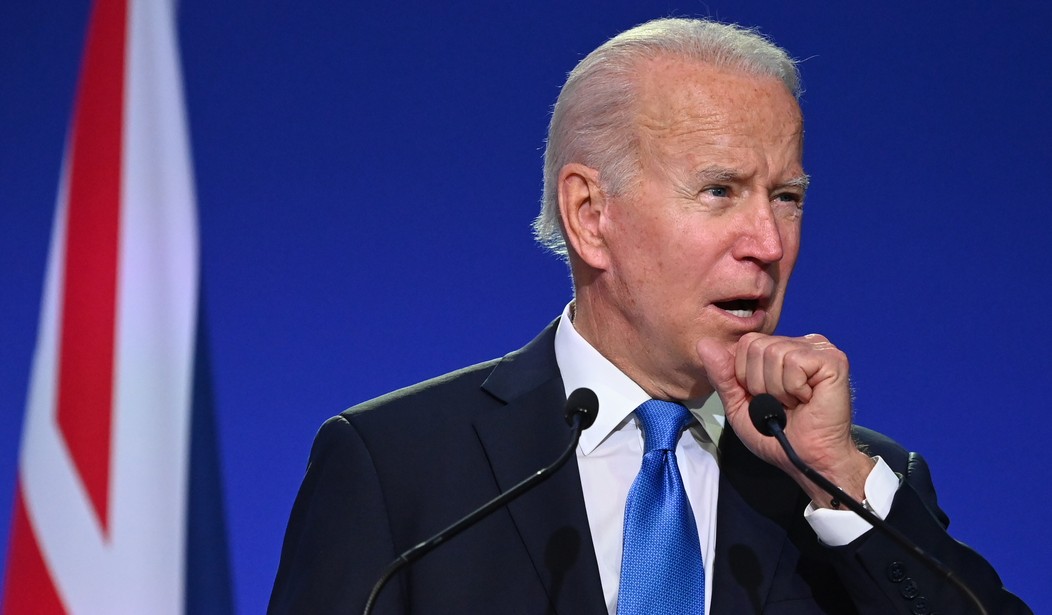With apparently nothing better to do — like, say, address runaway, record-high inflation — the Biden administration's Office of the Comptroller of the Currency (OCC) rolled out new guidance for banks and other large financial institutions this week aimed at assessing and mitigating "climate risk."
The OCC — which may sound familiar because Biden was recently forced to withdraw his nomination of Saule Omarova to head the office due to her radical writings and statements — rolled out its "draft principles designed to support the identification and management of climate-related financial risks by banks with more than $100 billion in total consolidated assets." For the next two months, the OCC will gather feedback from financial institutions on its guidance and roll that into "future guidance on climate-related financial risk" that is poised to impact essentially everything a bank does and how it is run.
As Reuters' Pete Schroeder put it well, the OCC's announcement is "sneaky significant" because the draft principles "basically say banks should make assessing climate risk a foundational part of their work."
This OCC announcement seems sneaky significant. The draft principles basically say banks should make assessing climate risk a foundational part of their work (and their supervisors will be expecting them to do so):https://t.co/HD7c0OlGhy
— Pete Schroeder (@peteschroeder) December 16, 2021
Among the risks the OCC looks to mitigate are "the harm to people and property arising from acute, climate-related events, such as hurricanes, wildfires, floods, and heatwaves, and chronic shifts in climate, including higher average temperatures, changes in precipitation patterns, sea level rise, and ocean acidification." Shouldn't banks already be prepared to respond to weather and natural disasters regardless?
Recommended
In addition to those "physical risks," the OCC climate guidance also wants financial institutions to prepare for "transition risks," defined as "stresses to certain banks or sectors arising from the shifts in policy, consumer and business sentiment, or technologies associated with the changes necessary to limit climate change." That last part, "changes necessary to limit climate change" carries the most weight. The Biden administration, through the OCC, is pushing banks to get ready for vague "changes necessary," probably defined by others in the Biden administration that has become increasingly radical.
So just what principles does the Biden administration want America's large financial institutions to adopt? Here's some of the guidance in the OCC's draft:
"A bank’s board and management should demonstrate an appropriate understanding of climate-related financial risk exposures," meaning bank officials must adopt the Biden administration's position on climate change? In order to communicate and enforce that understanding, the OCC suggests "establishing new structures for climate-related financial risks," another headache-inducing burden from the federal government.
"Management should incorporate climate-related risks into policies, procedures, and limits to provide detailed guidance on the bank’s approach to these risks in line with the strategy and risk appetite set by the board," the OCC's draft guidance also explains. "Policies, procedures, and limits should be modified when necessary to reflect the distinctive characteristics of climate-related risks and changes to the bank’s activities." So, banks should change their activities in light of climate change to... stop taking on risks located along the coasts? Stop financing or doing business with entities that don't adopt the Biden administration's thinking on climate change?
Then there's a whole section of the guidance focused on, or at least it appears to be in its current form, virtue signaling about climate change. "Any climate-related strategies, including any relevant corporate social responsibility objectives, should align with and support the bank’s broader strategy, risk appetite, and risk management framework," the OCC explains. "In addition, where banks engage in public communication of their climate-related strategies, boards and management should ensure that any public statements about their banks’ climate-related strategies and commitments are consistent with their internal strategies and risk appetite statements."
So what are these "risks" the Biden administration wants banks and financial institutions to consider and how might they impact consumers or businesses?
From credit risk, consideration of which "could include monitoring climate-related credit risks through sectoral, geographic, and single-name concentration analyses, including credit risk concentrations stemming from physical and transition risks," to liquidity, operational, legal, and reputational risk, the OCC is apparently going all-in to bring larger financial institutions into ideological compliance with the Biden administration's opinion on climate change by making the issue a part of everything banks do.

























Join the conversation as a VIP Member